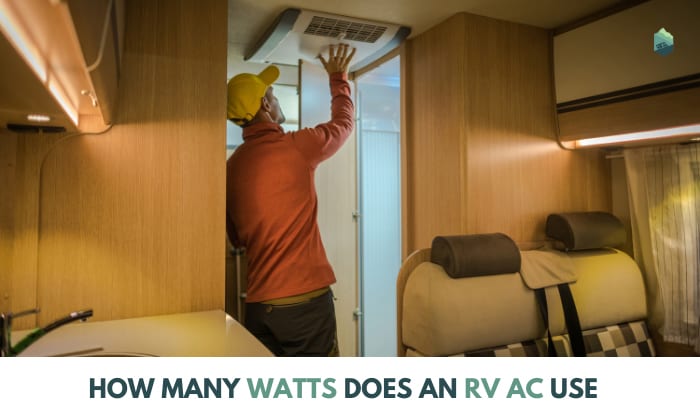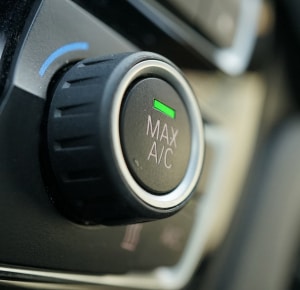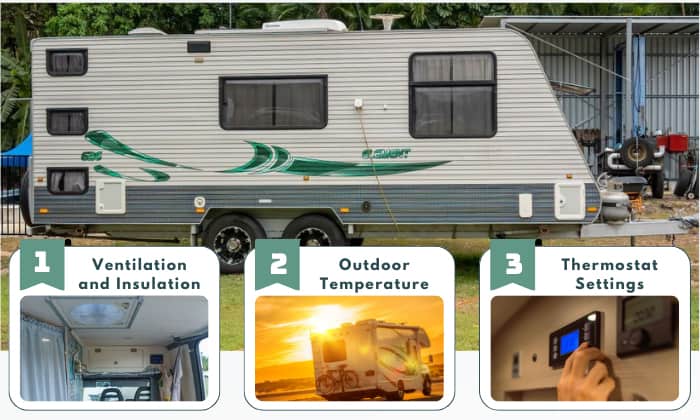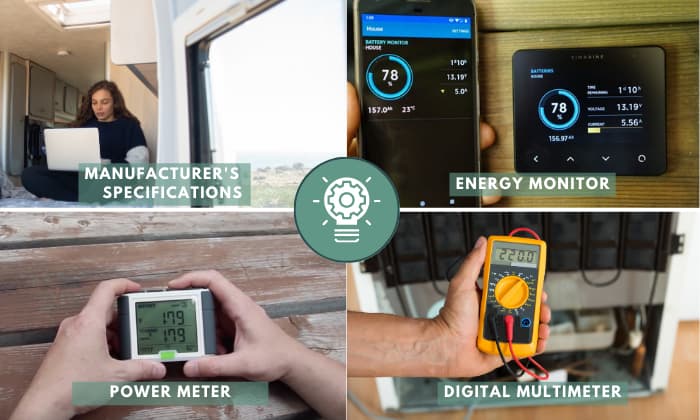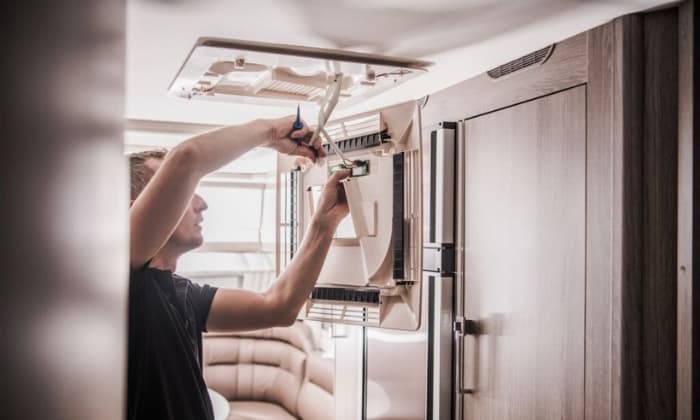Most RVs come with a 13,500 BTU output, meaning that a regular RV air conditioner would use around 1,350 watts to run RV AC. That’s based on an air conditioner with an EER rating of 10, where a 1,000 BTU output can produce 100 watts of power.
Here’s a guide on ‘how many watts does an RV AC use,’ with the details depending on the air conditioner type you have, the factors that influence the wattage, and how you can optimize this for lower power consumption.
Page Contents
Average Wattage of RV Air Conditioners
RV air conditioners come in different sizes and cooling capacities, typically measured in BTUs (British thermal units). So, the wattage could differ drastically.
On average, the wattage could be approximately 1,000 to 1,500 watts to run your recreational vehicle’s AC.
Knowing that the wattage usage of an RV AC is directly proportional to its cooling output, we can compute for your RV air conditioner wattage.
To calculate this, look for your air conditioner’s Energy Guide label that’s yellow and find the BTU rating and EER (energy efficiency ratio) grade. Then, use this formula:
BTU ÷ EER = wattage
For example, you run a 15,000 BTU RV AC with an EER rating of 11.
15,000 BTUs ÷ 11 EER = 1,363.64 watts
That means your air conditioner will be using 1,363.64 watts.
Common wattage ranges for different RV AC units based on eer
Today, most modern RV air conditioners come with an EER of 10 or above. Here’s the most common wattage ranges for different RV AC sizes and their power draw, with 13,500 and 15,000 BTU ACs being the most popular.
| AC Capacity | 10 EER | 11 EER | 12 EER |
| 5,000 BTU | 500 W | 455 W | 417 W |
| 7,000 BTU | 700 W | 636 W | 583 W |
| 10,000 BTU | 1,000 W | 909 W | 833 W |
| 13,500 BTU | 1,350 W | 1,227 W | 1,125 W |
| 15,000 BTU | 1,500 W | 1,364 W | 1,250 W |
| 20,000 BTU | 2,000 W | 1,818 W | 1,667 W |
| 24,000 BTU | 2,400 W | 2,182 W | 2,000 W |
| 27,000 BTU | 2,700 W | 2,455 W | 2,250 W |
Start-up vs running wattage
You may be confused if your RV AC unit wattage is higher than the range given above.
The watts needed to start your air conditioner is higher than the actual wattage when you run your AC. So, make sure that your generator has enough power to run the start-up wattage.
Start-up wattage– also known as surge wattage– refers to the power required by the AC unit to start and overcome the initial load. Once the AC unit is running, its power stabilizes to the running wattage.
To calculate your starting wattage, you can add a 200 to 400-watt buffer to ensure you don’t suffer from power shortage.
Here’s a chart on how many watts you need to start and run your recreational vehicle’s air conditioner, with a 10 EER rating and a 400-W buffer:
| AC Capacity | Start-Up Wattage | Running Wattage |
| 5,000 BTU | 900 W | 500 W |
| 7,000 BTU | 1,100 W | 700 W |
| 10,000 BTU | 1,400 W | 1,000 W |
| 13,500 BTU | 1,750 W | 1,350 W |
| 15,000 BTU | 1,900 W | 1,500 W |
| 20,000 BTU | 2,400 W | 2,000 W |
| 24,000 BTU | 2,800 W | 2,400 W |
| 27,000 BTU | 3,100 W | 2,700 W |
Factors Influencing Power Consumption
Other than the BTU and EER ratings of your RV AC, there are also other factors that can increase or decrease your AC’s wattage use.
- Ventilation and Insulation
Proper insulation of your RV can help retain cool air, reducing the workload on the AC unit and lowering power consumption. So, ensure that your RV gets adequate airflow.
- Outdoor Temperature
Your air conditioner needs more power to cool your recreational vehicle if it’s very hot outside. This leads to an increased consumption.
- Thermostat Settings
Setting the thermostat at lower temperatures can increase your power consumption. Higher thermostat settings, such as increasing the level to one degree higher, can help maintain comfort while minimizing energy usage.
Ways to Figure Out RV AC Power Consumption
The best way to know the power requirements and consumption of your RV AC is to consult the manufacturer’s specifications or user manual for your specific RV AC unit. It usually provides detailed information about power consumption and electrical requirements.
To figure out the actual consumption, you can use an energy monitor or a power meter. You’ll only need to plug the energy monitor to your power outlet and the AC to read the wattage level. You can also use a digital multimeter.
Tips for Optimizing RV AC Power Usage
Optimizing your RV AC power usage can help conserve energy and prolong your power supply. Consider these tips:
- Enhance your RV’s insulation by sealing gaps and using window coverings when it’s hot outside. This reduces heat transfer and decreases the workload on the AC unit.
- Park your RV in shaded areas to reduce sun exposure. Utilize ventilation techniques like opening windows, using roof vents, or installing fans to improve air circulation and reduce reliance on the AC unit.
- Regularly clean AC filters and coils to maintain optimal airflow and cooling efficiency. Dirty filters and coils restrict airflow and force the AC unit to work harder, increasing power consumption.
Recommended RV AC Unit
When choosing an RV AC unit, consider factors such as cooling capacity, energy efficiency, and reliability. An air conditioner that has just enough capacity for your RV space and has a high EER rating is a good option.
Frequently Asked Questions
Can I run an RV AC on solar power?
While it is possible to run an RV AC on solar power, it requires a significant investment in solar panels and battery storage. The power demands of an RV AC are high. So, solar power is a challenging option for standalone AC operation. Other than that, you’ll always need constant sun exposure for your air conditioner to work properly.
What generator size do I need to run my RV AC?
The generator size depends on the AC unit’s starting and running wattage. Consult the AC unit specifications to determine the appropriate generator size. In general, a 2,000 to 4,000-watt or higher generator should be able to handle most RV AC units.
Conclusion
To answer your question, ‘how many watts does an RV AC use?’, it uses an average of 1,350 watts for a 13,500 BTU AC and 1,500 watts for a 15,000 BTU AC. Knowing this is very important so you can effectively manage your energy consumption while you’re on the road.
This lets you make more informed decisions– and be able to set your power to the lowest wattage possible through proper optimization.
So, choose an RV AC unit that balances cooling performance and energy efficiency, so you can ensure a comfortable and energy-conscious camping experience!
“Hi, I’m Francis’ husband—Calvin. Our story began with our shared passion for traveling. I have had a career journey for over 11 years at Ford Motor Company, where I took on the role of BMS SW Process Engineer.
Together with my wife, I have dedicated countless hours to exploring every nook and corner of the world. Ten years living in an RV may seem long, but time seems to fly by when I’m doing what I love with the person I love.
FMCA’s 103rd International Convention & RV Expo in Gillette, WY,
Like my wife, I hope to help you see the beauty of traveling off the beaten path by sharing insights into this lifestyle. In addition to my corporate roles, I also launched our website – Outdoorbits, in 2015 and continue to contribute my knowledge and skills to the present day. And I’ll be completely honest with you—no hiding the truth or sugarcoating the possible challenges.
So, if you want to run away from the busy lifestyle to embrace nature, I’m your guy.”
